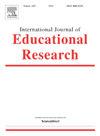欧盟高等教育区域主义的投影式尺度调整
IF 2.5
3区 教育学
Q1 EDUCATION & EDUCATIONAL RESEARCH
引用次数: 0
摘要
创建欧洲高等教育(HE)空间的政治项目取决于在高等教育政策利益相关者之间建立相互联系。在欧洲联盟(EU),这一过程被称为区域化,依赖于获得欧盟的资金,传统上是通过项目来实施的。虽然学者们已经解决了依赖项目来实施政策的问题,但这种项目化的空间含义还没有得到充分的研究。鉴于基于项目的合作的实施和发展需要重新调整做法,这是令人吃惊的。重新衡量经济、社会和政治的相互关系是如何被转移到民族国家的新的领土层面上的。本研究的重点是欧盟高等教育区域主义的重新调整,并探讨了欧盟政策如何将高等教育政策利益相关者的相互关系提升到新的地域水平。一个理论框架的发展,允许捕捉如何通过分配资源到一个新的规模,并通过建立结构和合作活动在一个新的规模投影导致重新缩放。为了分析欧盟资助项目实施所带来的规模调整实践,本文关注边境地区高等教育行为体和政府的区域建设策略。后者依靠欧盟的资金进行跨境合作,即Interreg。分析认为,通过投射来调整规模,使欧盟高等教育区域主义的制度安排相互交织。随着政府间合作、社区方案和组织合作日益相互依存,超国家的高等教育空间得到培育。本文章由计算机程序翻译,如有差异,请以英文原文为准。
Rescaling through projectification in the EU’s higher education regionalism
The political project of creating a European higher education (HE) space depends on the creation of interlinkages among HE policy stakeholders. Referred to as regionalization, in the European Union (EU) this process relies on the acquisition of EU funding, which traditionally is implemented through projects. While scholarship has tackled the reliance on projects to implement policy, the spatial implications of this projectification are underresearched. This is striking given that the implementation and development of project-based cooperation entails rescaling practices. Rescaling captures how economic, social and political interrelations are moved to new territorial levels above, below, and across the nation-state. This study focuses on rescaling in the EU HE regionalism and asks how projectified EU policies move interrelations of HE policy stakeholders to new territorial levels. A theoretical framework is developed that allows to capture how projectification leads to rescaling by allocating resources to a new scale and by establishing structures and cooperation activities at a new scale. To analyse the rescaling practices that result from the implementation of EU funded projects, this paper attends to the region-building strategies of HE actors and governments in border regions. The latter actors rely on the EU’s funding for cross-border cooperation, i.e. Interreg. The analysis provides that rescaling through projectification lets the institutional arrangements of the EU HE regionalism intertwine. With intergovernmental cooperation, community programmes and organizational cooperation becoming increasingly interdependent, the supranational HE space is fostered.
求助全文
通过发布文献求助,成功后即可免费获取论文全文。
去求助
来源期刊

International Journal of Educational Research
EDUCATION & EDUCATIONAL RESEARCH-
CiteScore
6.20
自引率
3.10%
发文量
141
审稿时长
21 days
期刊介绍:
The International Journal of Educational Research publishes regular papers and special issues on specific topics of interest to international audiences of educational researchers. Examples of recent Special Issues published in the journal illustrate the breadth of topics that have be included in the journal: Students Perspectives on Learning Environments, Social, Motivational and Emotional Aspects of Learning Disabilities, Epistemological Beliefs and Domain, Analyzing Mathematics Classroom Cultures and Practices, and Music Education: A site for collaborative creativity.
 求助内容:
求助内容: 应助结果提醒方式:
应助结果提醒方式:


